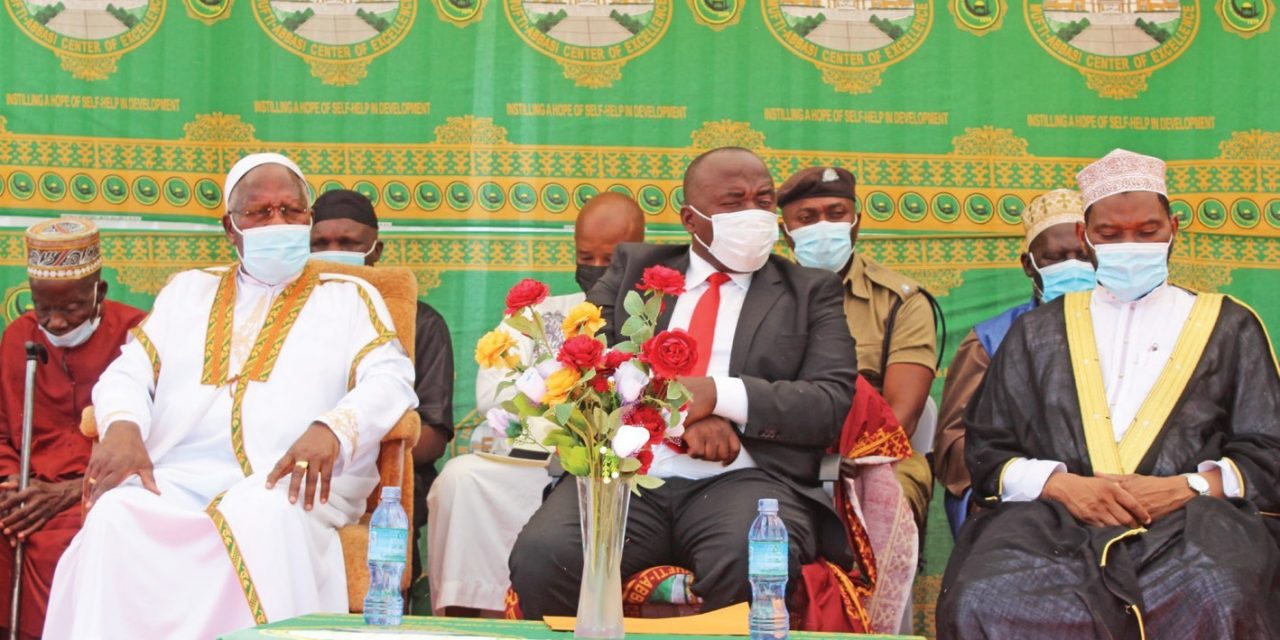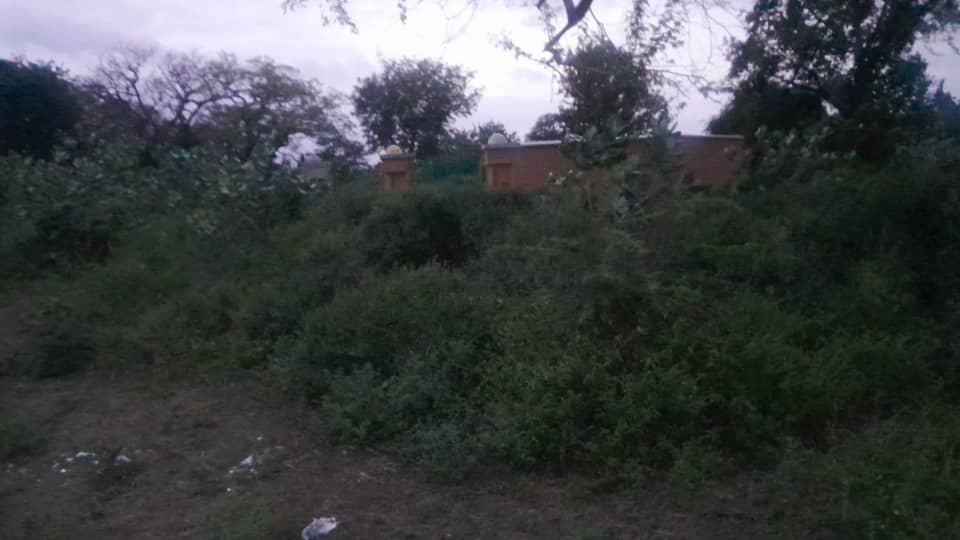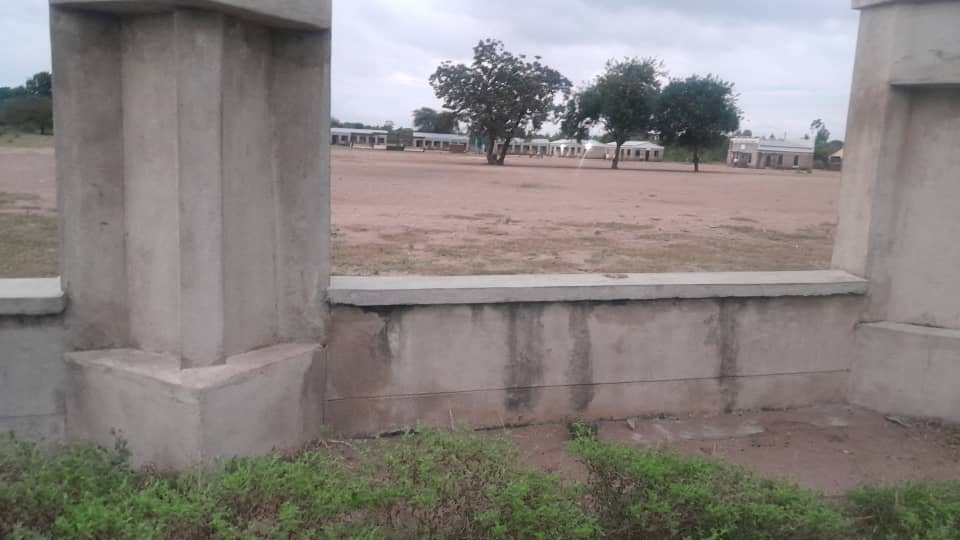Four years ago, Mangochi vibrated with hope. Government officials stood alongside Muslim leaders, exchanging handshakes and promises. President Chakwera’s representative, Richard Chimwendo Banda, spoke passionately about educating Malawi’s youth. A K5 million presidential donation seemed to seal the government’s commitment. Former President Bakili Muluzi contributed K1 million. The Muslim Association of Malawi’s National Chairperson, Sheikh Muhammad Idrissah, gave K2 million. The Islamic Vision and Mission (IVM) unveiled ambitious blueprints for a K15 billion center of learning excellence.
Today, only the wind moves through the empty space.

The Painful Reality: When Trust Dissolves
Walk through the decorative gate, and you’ll find a field occasionally used for Eid celebrations—not a single classroom, laboratory, or dormitory. While an Islamic primary school built by MAM stands nearby as proof of what transparent management can accomplish, the university grounds remain barren.
“The dream is still on,” insists IVM Secretary General Smith Kamwana, even as costs have doubled to K30 billion. Yet progress has stalled, with only a perimeter fence and some foundation blocks to show for years of effort.
What happened to the enthusiastic community that initially supported this vision? The evidence points not to reluctance to contribute but to a catastrophic breakdown in trust between leadership and community.

The Investigation Reveals Deeper Troubles
Behind the vacant land lies a troubling narrative of missteps and mismanagement.
As part of raising funds, IVM decided to purchase textiles, and they did so on credit with the aim of selling and raising funds through profits and then paying off the credit in installments.
According to a source close to the project, the plan failed when the intended buyers, Muslim women, didn’t like the wrappers.
“And as payment deadlines approached and the wrappers were not making enough sales, the manufacturer’s demands intensified. Facing potential legal action, IVM was forced to redirect 16 million kwacha out of 22 million kwacha they had secured for the university to settle the debt,” said the source.
When asked about fund usage, Kamwana states, “The money was used to do surveys and start construction of fence blocks—only eight blocks were completed, and the other 18 are at foundation level.” He makes no mention of the textile initiative.
Meanwhile, community members observed IVM officials “driving hired cars and sleeping in expensive lodges under the IVM account”—expenditures raising serious questions about resource allocation.

Community Support and Accountability Concerns
A source from Mangochi explains how community support evaporated: “People were demanding receipts, but they failed to produce them.” The initial fundraising was successful—gathering contributions at the launch, selling t-shirts and wrappers, and charging fees to food vendors.
“So, I doubt when they say the money was only 22 million because that’s what was realized on the launch date alone,” the source who was part of collecting contributions states.
The community members even offered practical support, with some “offering their vehicles for free to be used to fetch bricks, sand, etc.” But as financial questions mounted and transparency diminished, this support dried up.
Cultural Divides Deepened the Trust Gap
Cultural and educational divisions further complicated community engagement. Most of the people from the grouping that offered the land have limited formal education, yet they were deeply invested in the project’s success. When community members questioned IVM officials about financial decisions—such as “why hire such expensive cars and sleep in luxury hotels”—they encountered a troubling pattern.
“When asked who was signing the cheque to cash out that money because nobody in Mangochi was consulted, they were speaking English ,” our source explains. This language switching appeared deliberate, using educational differences to avoid financial accountability.
“Muslims in Mangochi really do value their religion and don’t hesitate to contribute,” the source emphasizes, challenging the narrative that the community was unwilling to support the project. The meetings included business tycoons, chiefs, and local organization representatives who expected to be kept informed about project developments. “Some of the members were wondering just to see the construction of the fence in progress without any of the members being informed in advance.”
The community’s frustration was direct: “We told them the issue of money is not for speaking English—talk the language we can all understand.” When transparency concerns went unaddressed, tensions escalated dramatically. “That’s when somebody just decided to chase them with panga knives,” the source recounts. The breakdown in trust became so severe that “they even closed IVM offices, saying it was just taking money that was not justified.”
Land Disputes and Contradictory Claims
Land disputes added another layer of complexity. While the government provided six hectares through the Muslim Association of Malawi, ownership conflicts emerged with another Muslim organization in Mangochi.
These internal struggles spilled into donor meetings. “There were serious tensions where the grouping told them never to build anything,” another source explains. Misunderstandings erupted during meetings with potential donors, forcing relocation of important signing ceremonies from Mangochi to Blantyre.
IVM’s claim that “the donor advised them to look for an additional place because it is small” contradicts their own architectural plans. “If the place was small, how come the designs they showed indicated the place was enough to meet everything?” questions our Mangochi source. The six-hectare plot remains visibly spacious when visited today.
Even a State House invitation to meet President Chakwera devolved into accusations about who received what benefits, further eroding community trust.
Leadership Warnings Went Unheeded
Even at the project’s launch, there were signs of concern from Muslim leadership. Muslim Association of Malawi Chairperson His Eminence Sheikh Idrisah Muhammad offered both support and stern warnings to IVM about project management.
The Chairman, who had brought guests from Turkey to assess the project for potential future contributions, specifically cautioned against self-interest among project managers.
“It is very unfortunate that people start a project for personal gains. Anything that starts with ‘I should gain something from this’ ends up in shambles. We do not expect that from IVM members. People have trusted you with their money, time, and resources—please do what is expected of you to accomplish it,” he emphasized.
He encouraged IVM members to work voluntarily rather than expecting personal benefits. Despite these concerns, Sheikh Idrisah demonstrated his commitment to the project by donating 2 million Kwacha after his speech.
Years later, his warnings about transparency and personal gain appear prophetic given the project’s current state.
The Path Forward: Rebuilding Trust Through Transparency
The tragedy lies not in Muslim unwillingness to contribute but in the breakdown of trust essential for any community project. The evidence suggests that when projects are managed transparently—like MAM’s successful Islamic primary school nearby—the community does support educational initiatives.
With the Mangochi community’s trust severely damaged, IVM faces a steep uphill battle. According to sources familiar with the situation, their most viable option now would be approaching FDH Bank for Islamic financing. However, this path comes with significant prerequisites.
“IVM has to find ways of generating funds because the community in Mangochi, which they were working with, has lost trust in them,” explains a source close to the project. “The best option would be to contact FDH Bank for Islamic financing; however, they have to show that they are capable and the project is viable and sustainable.”
This represents perhaps IVM’s last significant option after their previous commercial bank arrangement collapsed. While Kamwana maintains they are “still in touch with donors,” rebuilding credibility will require fundamental changes to their operating model.
As our source notes, “They have a high task to convince them that they have a proper structure to ensure there is accountability and transparency.” Without these fundamental reforms, neither banking institutions nor the community are likely to provide the support necessary to transform the decorative fence into a functioning university.




















